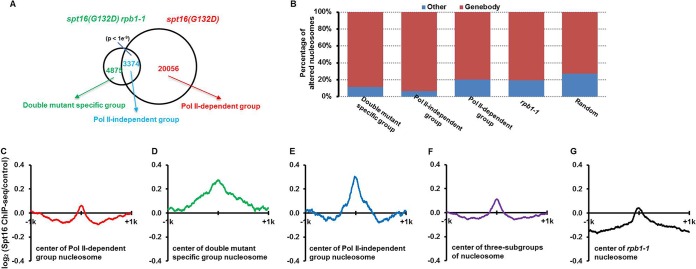FIG 2.
A subgroup of nucleosomes altered after Spt16 depletion is resistant to transcription inhibition. (A) The nucleosomes that are altered upon Spt16 depletion in the spt16(G132D) single mutant cells and spt16(G132D) rpb1-1 double mutant cells are separated into three subgroups: nucleosomes altered only in the spt16(G132D) rpb1-1 double mutant cells (double mutant-specific group [4,875]), nucleosomes altered in both the spt16(G132D) and spt16(G132D) rpb1-1 double mutant cells (Pol II-independent group [3,374]), and nucleosomes altered only in the spt16(G132D) cells (Pol II-dependent group [20,056]). A total of 28,305 random nucleosomes, which is equal to the total number of altered nucleosomes in the three groups, were chosen for analysis. (B) The percentage of nucleosomes from each subgroup in panel A at the gene body regions versus other regions was calculated. The nucleosomes altered in the rpb1-1 strain and a random set of nucleosomes were used as controls. (C to G) Spt16 is enriched at the “Pol II-independent” subgroup of nucleosomes. Spt16 ChIP was performed, and the Spt16 ChIP-seq normalized reads from 1 kb upstream to 1 kb downstream of centers of each subgroup of altered nucleosome defined in the legend to Fig. 1A and B were calculated. For comparisons, we also included 6,543 nucleosomes altered in rbp1-1 mutant cells.

